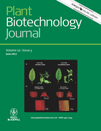
PLANT BIOTECHNOLOGY JOURNAL
Scope & Guideline
Exploring the frontiers of plant science and genomics.
Introduction
Aims and Scopes
- Genetic Engineering and Gene Editing:
The journal emphasizes research involving genetic engineering techniques, particularly CRISPR/Cas9 and other genome editing technologies, aimed at enhancing crop traits such as disease resistance, abiotic stress tolerance, and nutritional quality. - Plant-Microbe Interactions:
Research exploring the interactions between plants and various microbes, including pathogens and beneficial organisms, is a core focus, highlighting mechanisms of resistance and symbiosis. - Metabolic Engineering and Trait Improvement:
Studies on metabolic pathways in plants aimed at improving traits such as yield, nutritional content, and stress tolerance through metabolic engineering techniques are frequently published. - Genomics and Molecular Breeding:
The journal publishes advancements in genomics, including genome sequencing, transcriptomics, and molecular breeding strategies that facilitate the identification and manipulation of genetic traits in crops. - Functional Genomics:
Research that investigates gene function and regulatory networks in plants, contributing to the understanding of complex traits and the development of new breeding strategies. - Sustainable Agriculture and Crop Improvement:
The journal aims to address challenges in sustainable agriculture through biotechnological innovations that enhance crop resilience and productivity while minimizing environmental impacts.
Trending and Emerging
- Prime Editing and Advanced Genome Editing Techniques:
The use of prime editing and other advanced genome editing techniques is gaining momentum, with researchers exploring their potential for precise genetic modifications and applications in crop improvement. - Multi-Omics Approaches:
There is an increasing trend towards integrating multi-omics approaches (genomics, proteomics, metabolomics) to gain a comprehensive understanding of plant traits and their interactions with the environment. - Sustainable Biotechnology Practices:
Research focusing on sustainable practices in plant biotechnology, including the development of eco-friendly pest management strategies and biofortification techniques, is becoming more prominent. - Plant-Based Production Systems:
The trend towards utilizing plants for the production of pharmaceuticals, vaccines, and other high-value compounds is on the rise, with a focus on engineering plants for enhanced production capabilities. - Climate Resilience and Adaptation Strategies:
As climate change poses challenges to agriculture, there is a growing emphasis on research aimed at enhancing crop resilience to abiotic stresses such as drought, salinity, and heat.
Declining or Waning
- Traditional Breeding Techniques:
Research centered on traditional breeding methods has become less prevalent as genetic engineering and molecular techniques gain prominence, leading to a reduced emphasis on classical approaches. - Basic Plant Physiology Studies:
Studies purely focused on basic plant physiology without a clear application to biotechnology or crop improvement are appearing less frequently, as the journal prioritizes research with direct biotechnological implications. - Single Trait Focus:
There is a noticeable decline in studies that focus solely on single trait improvements without considering the broader implications for plant resilience or adaptability in changing environments. - Non-GMO Approaches:
As interest in genetically modified organisms (GMOs) continues to rise, research that emphasizes non-GMO methods without clear biotechnological applications is receiving less attention.
Similar Journals

Plant Biotechnology Reports
Cultivating Knowledge in Biotechnology ResearchPlant Biotechnology Reports is a premier academic journal published by SPRINGER, focusing on cutting-edge research in the dynamic fields of biotechnology and plant sciences. With an ISSN of 1863-5466 and an E-ISSN of 1863-5474, this journal serves as a vital platform for disseminating high-quality studies from 2008 to 2024. Situated in Japan, it has earned commendable status within the academic community, ranking in the Q2 quartile for Plant Science and Q3 for Biotechnology in 2023, placing it among the top-tier publications in its domain. Notably, it ranks #160/516 in the Scopus category for Agricultural and Biological Sciences - Plant Science, reflecting its impact and reach in the relevant fields. While it does not currently offer open access, the journal remains an essential resource for researchers, professionals, and students eager to explore breakthroughs in plant biotechnology. Researchers contribute significant advancements that not only drive scientific understanding but also foster innovation in agricultural practices, making this journal pivotal for both academic and practical applications in the realm of biotechnology.

Journal of Genetic Engineering and Biotechnology
Empowering Discoveries in Genetic and Biotechnological SciencesJournal of Genetic Engineering and Biotechnology, published by Elsevier Science Inc, is a prestigious open-access journal that stands at the forefront of research in the fields of biotechnology and genetics. Since its inception in 2011, the journal has provided a platform for cutting-edge studies that explore the complexities and innovations within genetic engineering and its applications in biotechnology. With a commendable Impact Factor and recognized as a Q2 journal in both biotechnology and genetics as per 2023 categorization, it ranks well within Scopus, evidencing its influence in the scientific community. Researchers and professionals accessing articles published in this journal benefit from timely contributions that bridge theoretical and practical aspects of genetic technologies. By fostering a collaborative environment, the Journal of Genetic Engineering and Biotechnology aims to promote advancements that drive science forward, making it an essential resource for students, academics, and industry practitioners alike. For those interested in making their mark in these rapidly evolving fields, this journal offers unparalleled access to high-quality, peer-reviewed research.

MOLECULAR BREEDING
Fostering Excellence in Molecular Genetics and Crop ScienceMOLECULAR BREEDING is a prestigious journal published by Springer, dedicated to advancing the field of agronomy, plant science, and biotechnology through innovative research contributions. With an impressive ISSN of 1380-3743 and E-ISSN 1572-9788, this journal has continuously served the scientific community since its inception in 1995. Operating from the Netherlands, MOLECULAR BREEDING is recognized for its high impact factor and status in the Q1 quartile for both Agronomy and Crop Science and Plant Science in the latest 2023 metrics, highlighting its influential role in these domains. With strong Scopus rankings reflecting its position within the top percentiles of various related fields—including a notable 81st percentile in Plant Science—this journal is essential for researchers, professionals, and students striving to understand and innovate in molecular genetics and breeding techniques. Although it does not provide open access, its rigorous peer-review process ensures that published articles maintain the highest standards and contribute significantly to the scientific discourse. The journal’s diverse scope encompasses significant advancements in molecular biology and genetics, ultimately supporting the global objectives of sustainable agriculture and enhanced crop resilience.
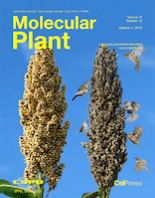
Molecular Plant
Advancing plant science through molecular insights.Molecular Plant, published by CELL PRESS, is a premier journal dedicated to advancing the field of molecular biology and plant science. With an impressive impact factor reflecting its rigorous peer-review process and the high quality of its published research, this journal has achieved a remarkable Q1 ranking in both Molecular Biology and Plant Science categories as of 2023. Its Scopus rankings place it within the top echelons of its field, holding 2nd place in Agricultural and Biological Sciences - Plant Science, showcasing its vital role in disseminating impactful research. The journal covers a broad range of topics, including but not limited to, plant genetics, molecular interactions, and biotechnological advances. Research published in Molecular Plant has the potential to significantly influence agricultural practices and biotechnological applications, making it an essential resource for researchers, professionals, and students eager to stay at the forefront of plant research. Access options for the journal are tailored to accommodate a wide audience, facilitating engagement with cutting-edge findings and breakthroughs. As the field of plant science continues to evolve, Molecular Plant remains integral to fostering innovation and collaboration within the scientific community.
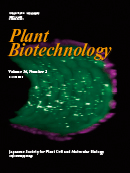
Plant Biotechnology
Connecting Researchers to the Heart of Plant Biology.Plant Biotechnology is a distinguished journal published by the Japanese Society for Plant Cell and Molecular Biology, committed to advancing the field of plant biotechnology through the dissemination of high-quality research. With an ISSN of 1342-4580, this journal caters to a global audience interested in agronomy, crop science, and plant molecular biology. The journal has achieved notable rankings, including Q2 in Agronomy and Crop Science and Q2 in Plant Science, underscoring its relevance and impact in these fields according to the latest 2023 metrics. Furthermore, it holds a respectable position within Scopus rankings across multiple categories, indicating its contribution to the academic community. Although it is not an open-access journal, its regular publications, spanning from 1997 to 2024, feature cutting-edge studies that explore innovative approaches and technologies in plant science. Researchers, professionals, and students will find Plant Biotechnology an essential resource for staying informed on significant advancements and trends in plant research.

Journal of Integrative Plant Biology
Integrating Insights for a Greener TomorrowThe Journal of Integrative Plant Biology, published by WILEY, is a premier academic journal that has been at the forefront of advancing research in plant biology since its inception in 2005. With a notable impact factor and a robust Scopus ranking—positioned at #7 out of 516 in Plant Science and #18 out of 438 in Biochemistry—this journal is recognized as a Q1 journal in multiple categories, including Biochemistry and Plant Science. The journal aims to bridge the gaps between various disciplines in plant research, emphasizing integrative and interdisciplinary approaches to understanding plant biology. With options for open access, the Journal of Integrative Plant Biology ensures broad visibility and impact of research findings, making it an invaluable resource for researchers, professionals, and students looking to stay informed on innovative advancements in the field. Its headquarters are located in the United Kingdom, further amplifying its reach within the global academic community.

JOURNAL OF PLANT BIOCHEMISTRY AND BIOTECHNOLOGY
Exploring the Synergy of Biochemistry and BiotechnologyJOURNAL OF PLANT BIOCHEMISTRY AND BIOTECHNOLOGY, published by SPRINGER INDIA, is a leading publication dedicated to advancing research in the fields of plant biochemistry, biotechnology, agronomy, and crop science. With an ISSN of 0971-7811 and E-ISSN 0974-1275, the journal encompasses a wide range of studies aimed at enhancing our understanding of plant biological processes and their applications in agriculture and biotechnology. It has achieved a noteworthy Q2 ranking in Agronomy and Crop Science and Plant Science, as well as a Q3 ranking in Biotechnology, reflecting its quality and relevance in contemporary research. Notably, the journal ranks #166 in Plant Science and #133 in Agronomy, both falling in the top 67th percentile. With a rich history spanning from 1992 to 2024, the journal is committed to providing open access to innovative research findings that bridge the gap between laboratory discoveries and their practical applications in sustainable agriculture. Researchers, professionals, and students will find a wealth of knowledge and inspiration to advance their work in the dynamic field of plant sciences at this esteemed journal.
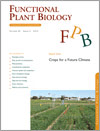
FUNCTIONAL PLANT BIOLOGY
Advancing Plant Science for a Sustainable FutureFUNCTIONAL PLANT BIOLOGY is a prestigious academic journal published by CSIRO PUBLISHING, specializing in the dynamic fields of Agronomy and Crop Science as well as Plant Science. With an ISSN of 1445-4408 and an E-ISSN of 1445-4416, this journal provides a platform for innovative research that addresses key challenges in plant functional biology, ranging from genetics and physiology to ecological interactions. As evidenced by its impact factor and competitive rankings, including Q1 in Agronomy and Crop Science and Q2 in Plant Science, FUNCTIONAL PLANT BIOLOGY holds a significant place in the scientific community, ranking in the top tiers of Scopus for both categories. The journal supports open access options, ensuring that critical research is widely disseminated and accessible to researchers, professionals, and students around the globe. With a publication history spanning from 2002 to 2024, the journal continues to foster the advancement of plant science, making significant contributions to sustainable agricultural practices and ecological research in Australia and beyond.
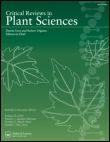
CRITICAL REVIEWS IN PLANT SCIENCES
Connecting global researchers in plant science.CRITICAL REVIEWS IN PLANT SCIENCES, published by Taylor & Francis Inc, is a prestigious journal that has been advancing the field of plant science since its inception in 1983. With an impressive impact factor and consistently ranked in the top quartile (Q1) of its category, this journal is a leading platform for the dissemination of peer-reviewed research that spans the breadth of plant biology, ecology, and agricultural applications. Housed in the United Kingdom, it serves an international readership, making significant contributions to our understanding of plant systems and their environmental interactions. This journal is highly regarded within the Scopus rankings, holding an impressive position of 18 out of 516 journals in the Agriculture and Biological Sciences category, placing it in the 96th percentile. Although not currently open access, the journal provides valuable insights and critical reviews that are essential for researchers, professionals, and students striving to further their knowledge and bolster their own research in plant sciences.

PLANTA
Elevating botanical research to new heights.PLANTA, published by SPRINGER, stands as a pivotal journal in the field of plant sciences and genetics, known for its rigorous peer-reviewed research that has influenced the advancement of botanical science since its inception in 1925. With an impressive trajectory of convergence from the years 1925 to 1945, and again from 1947 to 2024, this journal maintains a strong reputation, currently categorized in the prestigious Q1 tier of Plant Science and Q2 tier in Genetics as of 2023. The journal is recognized for its high impact, ranked #64 out of 516 in Plant Science by Scopus, representing the top 87th percentile within its category, while also securing a strong position in Genetics with a #92 rank. The journal serves as a critical resource for researchers, professionals, and students who are eager to explore the complex genetics, biochemistry, and evolutionary biology of plants. Though primarily subscription-based, the quality of the research published in PLANTA makes it an essential reading for anyone serious about advancing their knowledge and understanding of plant sciences.